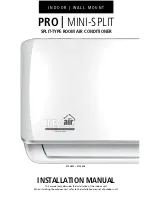
DC Inverter U-match Series Cassette Type Unit
27
sensitivity may not be adequate, or may need re-calibration. (Detection equipment
shall be calibrated in a refrigerant-free area).
Ensure that the detector is not a potential source of ignition and is suitable for
the refrigerant used. Leak detection equipment shall be set at a percentage of the
LFL of the refrigerant and shall be calibrated to the refrigerant employed and the
appropriate percentage of gas (25% maximum) is confirmed.
Leak detection fluids are suitable for use with most refrigerants but the use of
detergents containing chlorine shall be avoided as the chlorine may react with the
refrigerant and corrode the copper pipe-work.
If a leak is suspected, all naked flames shall be removed / extinguished. If a
leakage of refrigerant is found which requires brazing, all of the refrigerant shall be
recovered from the system, or isolated (by means of shut off valves) in a part of the
system remote from the leak. Oxygen free nitrogen (OFN) shall then be purged
through the system both before and during the brazing process.
2.2.5 Refrigerant Adding
NOTE!
Before and during operation, use an appropriate refrigerant leak detector to monitor
the operation area and make sure the technicians can be well aware of any
potential or actual leakage of inflammable gas. Make sure the leak detecting device
is applicable to inflammable refrigerant. For example, it should be free of sparks,
completely sealed and safe in nature.
See the following table for the amount of additional refrigerant.
Item
Model
Standard
Pipe Length
Unnecessary
Charge Pipe
Length
Additional Refrigerant
Amount for Extra Pipe
YC12G4/O
5.0m
≤7.0m
16 g/m
YC18G4/O
YC24G4/O
20 g/m
YC30G4/O
YC42G4T/O
















































